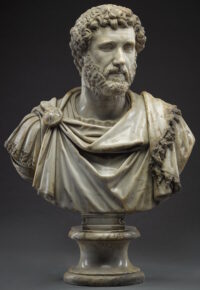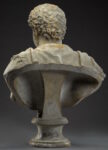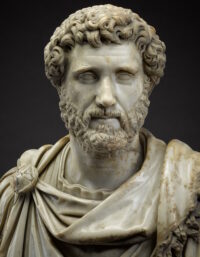 The Getty Museum has acquired a larger-than-life-sized portrait bust of the emperor Antoninus Pius from a private collection in England. It is one of the finest surviving portraits of Antoninus Pius, but previously unpublished until it appeared at auction last year. The deal isn’t quite done yet — the museum awaits an export license from the UK Ministry of Culture — but should it go through, the bust will go on display alongside the Getty Villa’s other important Antonine-period sculptures.
The Getty Museum has acquired a larger-than-life-sized portrait bust of the emperor Antoninus Pius from a private collection in England. It is one of the finest surviving portraits of Antoninus Pius, but previously unpublished until it appeared at auction last year. The deal isn’t quite done yet — the museum awaits an export license from the UK Ministry of Culture — but should it go through, the bust will go on display alongside the Getty Villa’s other important Antonine-period sculptures.
A prime example of Antoninus Pius’s main portrait type, the bust was created sometime after he ascended the throne in AD 138. With minor variations, this portrait type remained the emperor’s official image throughout his reign until AD 161. Carved from a single block of fine-grained white marble, the bust shows the emperor as a mature man with distinct facial features, a full, neatly trimmed beard, and thick curly hair. He wears a tunic, a cuirass (body armor), and a fringed paludamentum (a general’s cloak) folded in half and pinned at his right shoulder.
“This exquisitely sculpted and remarkably preserved portrait ranks among the finest of more than 100 versions of Antoninus’s image that have survived from antiquity,” says Timothy Potts, Maria Hummer-Tuttle and Robert Tuttle Director of the Getty Museum. “The bust adds a new highlight to the series of high-quality imperial portraits at the Getty Villa, including the full-length statue of Antoninus’ wife Faustina the Elder, and the busts of Augustus, Germanicus, Caligula, and Commodus.” […]
“Many objects in our collection were made in the Antonine period, as it is known today, including portraits, mythological sculptures, sarcophagi, and numerous other works,” says Jens Daehner, associate curator of antiquities at the Getty Museum. “The bust of Antoninus provides a firmly dated visual reference for what characterized Roman aesthetics during that period. On display in our galleries, the bust will convey to visitors how, for example, Antonine sculptors carved drapery folds, used drills to give texture to hair, or incised the eyes of their sitters.”
 Believed to have been discovered in Pozzuoli in the 19th century, the bust is first documented in 1851 when it was bought by Robert Martin Berkeley (1823-1897) and his bride Lady Mary Catherine Berkeley (1829-1924) on their honeymoon. Berkeley’s honeymoon diary records buying the bust on June 11, 1851, from antiques shop of dealer Raffaello Barone on Via Costantinopoli in Naples’ historic center. He paid 240 ducats (about $5400 today, adjusted for inflation). The newlyweds brought it home to Spetchley Park in Worcestershire where it has remained all these years until the descendants sold it last December.
Believed to have been discovered in Pozzuoli in the 19th century, the bust is first documented in 1851 when it was bought by Robert Martin Berkeley (1823-1897) and his bride Lady Mary Catherine Berkeley (1829-1924) on their honeymoon. Berkeley’s honeymoon diary records buying the bust on June 11, 1851, from antiques shop of dealer Raffaello Barone on Via Costantinopoli in Naples’ historic center. He paid 240 ducats (about $5400 today, adjusted for inflation). The newlyweds brought it home to Spetchley Park in Worcestershire where it has remained all these years until the descendants sold it last December.
This bust has many features in common with a bust in the collection of Castle Howard in Yorkshire. The carving of the draping, fibula and fringe of the paludamentum is so similar in both busts that it is probably they were produced by the same workshop.
 Antoninus Pius (b. 86 – d. 161 A.D.) was the adopted son and successor of Hadrian (b. 76 – d. 138 A.D.) and the uncle, father-in-law and adoptive father of Marcus Aurelius (b. 121 – d. 180 A.D.). Marcus Aurelius wrote an extraordinary tribute to Pius in the Meditations. In the First Notebook, Marcus lists the things he learned from people who were formative influences in his development as a philosopher, emperor and man of virtue. The entry on his father is the only description of an emperor written by another emperor who knew him as family, friend and mentor and it was never intended for publication. Marcus’ notebooks were journals, not letters, not inscriptions, not future memoirs, so what Marcus writes about Pius is a deeply personal assessment of his father’s many strengths and virtues. For Marcus, Pius was the Stoic ideal as man and emperor.
Antoninus Pius (b. 86 – d. 161 A.D.) was the adopted son and successor of Hadrian (b. 76 – d. 138 A.D.) and the uncle, father-in-law and adoptive father of Marcus Aurelius (b. 121 – d. 180 A.D.). Marcus Aurelius wrote an extraordinary tribute to Pius in the Meditations. In the First Notebook, Marcus lists the things he learned from people who were formative influences in his development as a philosopher, emperor and man of virtue. The entry on his father is the only description of an emperor written by another emperor who knew him as family, friend and mentor and it was never intended for publication. Marcus’ notebooks were journals, not letters, not inscriptions, not future memoirs, so what Marcus writes about Pius is a deeply personal assessment of his father’s many strengths and virtues. For Marcus, Pius was the Stoic ideal as man and emperor.
XIII. In my father, I observed his meekness; his constancy without wavering in those things, which after a due examination and deliberation, he had determined. How free from all vanity he carried himself in matter of honour and dignity, (as they are esteemed:) his laboriousness and assiduity, his readiness to hear any man, that had aught to say tending to any common good: how generally and impartially he would give every man his due; his skill and knowledge, when rigour or extremity, or when remissness or moderation was in season; how he did abstain from all unchaste love of youths; his moderate condescending to other men’s occasions as an ordinary man, neither absolutely requiring of his friends, that they should wait upon him at his ordinary meals, nor that they should of necessity accompany him in his journeys; and that whensoever any business upon some necessary occasions was to be put off and omitted before it could be ended, he was ever found when he went about it again, the same man that he was before.
His accurate examination of things in consultations, and patient hearing of others. He would not hastily give over the search of the matter, as one easy to be satisfied with sudden notions and apprehensions. His care to preserve his friends; how neither at any time he would carry himself towards them with disdainful neglect, and grow weary of them; nor yet at any time be madly fond of them. His contented mind in all things, his cheerful countenance, his care to foresee things afar off, and to take order for the least, without any noise or clamour.
 Moreover how all acclamations and flattery were repressed by him: how carefully he observed all things necessary to the government, and kept an account of the common expenses, and how patiently he did abide that he was reprehended by some for this his strict and rigid kind of dealing. How he was neither a superstitious worshipper of the gods, nor an ambitious pleaser of men, or studious of popular applause; but sober in all things, and everywhere observant of that which was fitting; no affecter of novelties: in those things which conduced to his ease and convenience, (plenty whereof his fortune did afford him,) without pride and bragging, yet with all freedom and liberty: so that as he did freely enjoy them without any anxiety or affectation when they were present; so when absent, he found no want of them.
Moreover how all acclamations and flattery were repressed by him: how carefully he observed all things necessary to the government, and kept an account of the common expenses, and how patiently he did abide that he was reprehended by some for this his strict and rigid kind of dealing. How he was neither a superstitious worshipper of the gods, nor an ambitious pleaser of men, or studious of popular applause; but sober in all things, and everywhere observant of that which was fitting; no affecter of novelties: in those things which conduced to his ease and convenience, (plenty whereof his fortune did afford him,) without pride and bragging, yet with all freedom and liberty: so that as he did freely enjoy them without any anxiety or affectation when they were present; so when absent, he found no want of them.
Moreover, that he was never commended by any man, as either a learned acute man, or an obsequious officious man, or a fine orator; but as a ripe mature man, a perfect sound man; one that could not endure to be flattered; able to govern both himself and others. Moreover, how much he did honour all true philosophers, without upbraiding those that were not so; his sociableness, his gracious and delightful conversation, but never unto satiety; his care of his body within bounds and measure, not as one that desired to live long, or over-studious of neatness, and elegancy; and yet not as one that did not regard it: so that through his own care and providence, he seldom needed any inward physic, or outward applications: but especially how ingeniously he would yield to any that had obtained any peculiar faculty, as either eloquence, or the knowledge of the laws, or of ancient customs, or the like; and how he concurred with them, in his best care and endeavour that every one of them might in his kind, for that wherein he excelled, be regarded and esteemed: and although he did all things carefully after the ancient customs of his forefathers, yet even of this was he not desirous that men should take notice, that he did imitate ancient customs.
Again, how he was not easily moved and tossed up and down, but loved to be constant, both in the same places and businesses; and how after his great fits of headache he would return fresh and vigorous to his wonted affairs. Again, that secrets he neither had many, nor often, and such only as concerned public matters: his discretion and moderation, in exhibiting of the public sights and shows for the pleasure and pastime of the people: in public buildings, congiaries, and the like.
In all these things, having a respect unto men only as men, and to the equity of the things themselves, and not unto the glory that might follow. Never wont to use the baths at unseasonable hours; no builder; never curious, or solicitous, either about his meat, or about the workmanship, or colour of his clothes, or about anything that belonged to external beauty. In all his conversation, far from all inhumanity, all boldness, and incivility, all greediness and impetuosity; never doing anything with such earnestness, and intention, that a man could say of him, that he did sweat about it: but contrariwise, all things distinctly, as at leisure; without trouble; orderly, soundly, and agreeably.
A man might have applied that to him, which is recorded of Socrates, that he knew how to want, and to enjoy those things, in the want whereof, most men show themselves weak; and in the fruition, intemperate: but to hold out firm and constant, and to keep within the compass of true moderation and sobriety in either estate, is proper to a man, who hath a perfect and invincible soul.